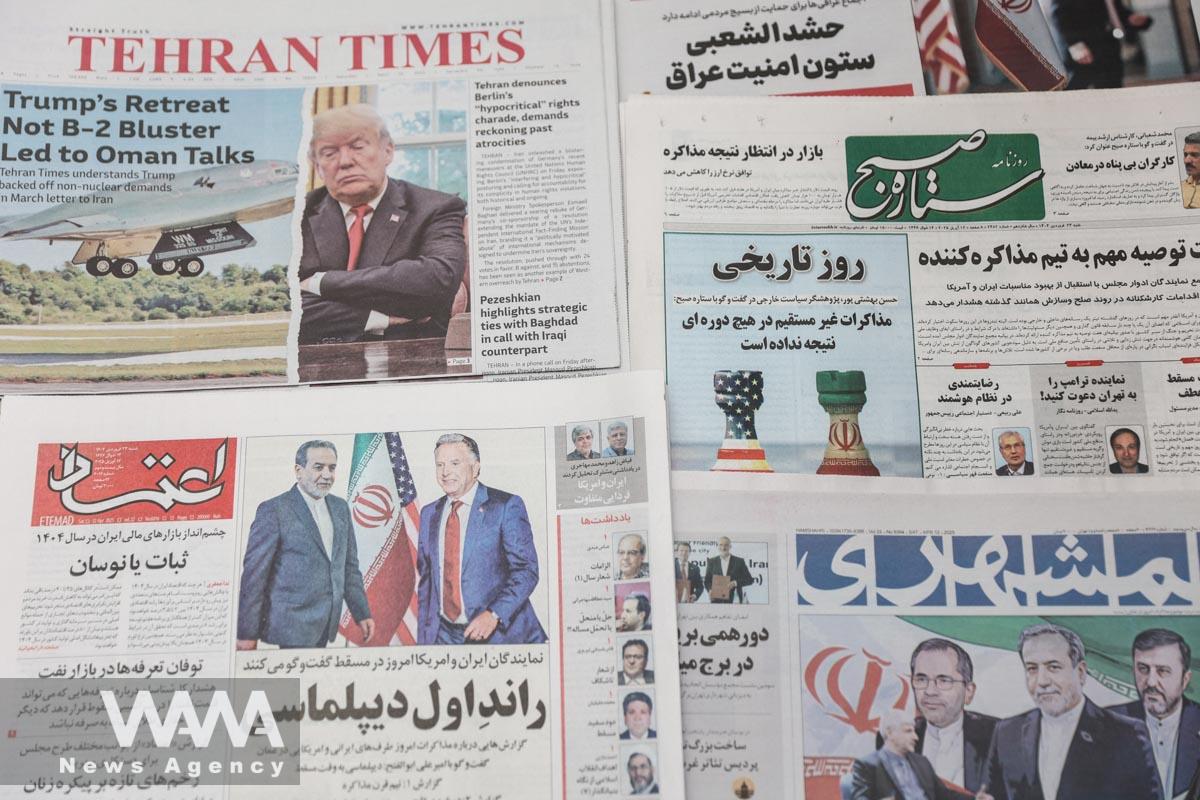When “Negotiation” Becomes a Nightmare for Israel
WANA (Apr 13) – Amid the first round of indirect talks between Iran and the U.S. in Oman, an unexpected uproar emerged—not from domestic critics or skeptical analysts, but from Israel and the Iranian opposition. The attacks weren’t aimed at Tehran or Washington, but at a surprising target: the U.S. envoy, Steve Witkoff.
While both sides remained tight-lipped and the details of the negotiations stayed confidential, the enemies of diplomacy made their concerns loud and clear. With no seat at the table, their only weapon is noise—amplified across media platforms. Israel and the Iranian opposition, from Tel Aviv to Twitter, found common ground: discrediting the negotiations by targeting the negotiator.
“Steve Witkoff is dangerously naive.” This wasn’t the voice of an Iranian analyst, but of Emily Schrader, a well-known Israeli commentator. In a furious post, she claimed: “Wetkoff is dangerously naive, with zero understanding of the complexities of Gaza, Ukraine, or Iran. He is paving the way for Iran to continue its nuclear program.”

No War, No Peace; Just Crisis Management
WANA (Apr 11) – The indirect talks between Iran and the United States, mediated by Oman, are designed in a way that they’re never officially labeled as “negotiations“—yet they carry all the features of one. It’s a precise, layered, multi-dimensional game that may seem like a side event to many, but in reality, it’s a […]
Some American analysts argue that Israel’s national security doctrine heavily relies on maintaining Iran as a looming threat to secure continued Western support. If Iran ceases to be the region’s top concern, Israel will be forced to confront its real internal and regional challenges—from a crisis of legitimacy at home to growing discontent among Arab nations.
This perspective sheds light on Israel’s harsh opposition to any form of negotiation. For perhaps the first time, talks are driven not by American dominance, but by American necessity—a reality more alarming for Israel than any potential Iranian gains.
One media analyst observed: “Israel’s opposition to the talks is a smokescreen. Their real goal is to silence Hezbollah and the PMF under the guise of an agreement, not confront them.” The suggestion is clear: Israel seeks a calmer regional climate to push forward with operations in southern Syria, Yemen, and to apply political pressure in Lebanon and Iraq.
Iran’s Foreign Ministry announced that Araghchi, Iran’s FM and Witkoff, U.S. representative had a brief conversation in the presence of Oman’s FM before leaving the #negotiation venue.#US #Iran pic.twitter.com/Oo46q8cvxx
— WANA News Agency (@WANAIran) April 12, 2025
A deal with Iran—even if it appears controversial in the media—could in fact provide Israel with the very environment it desires.
In this light, Israel’s feigned opposition to diplomacy becomes a form of dopamine for Iranian public opinion—offering a sense of triumph while the battlefield is being redrawn behind the scenes.
But this time, Tehran seems more alert than ever. Its resistance to media presence at the talks, and threats to walk away if the process becomes performative, signal a heightened awareness. Iran hasn’t lost the game—it’s redefining it.
Steve Witkoff himself is a noteworthy figure. Before Oman, he sought solutions to the war in Ukraine—proposing a partition of the country: the east to Russia, the center to Kyiv, and the west to NATO. The idea was not only rejected but mocked by the Kremlin. NATO on Russia’s border, once again, mirrored the very mistake that ignited the war. This history has led many to doubt his initiative in Oman.

An Iranian newspaper with a cover photo of Iran’s Foreign Minister Abbas Araqchi and U.S. Middle East envoy Steve Witkoff, is seen in Tehran, Iran, April 12, 2025. Majid Asgaripour/WANA (West Asia News Agency)
Israeli journalist Barak Ravid put it bluntly: “Witkoff may be an asset for the U.S., but he’s a red flag for Israel. He’s pursuing a deal that could undermine Tel Aviv’s strategic position.”
As talks begin, a new voice emerges within American public opinion: If nuclear weapons are truly the concern, why is Israel—an NPT outsider that’s never allowed inspections—exempt? Why does the IAEA not dare approach Dimona, while its inspectors shuttle through Iran like taxis on demand?
Negotiating with Iran is more than a nuclear deal—it’s a mirror held up to Western audiences. A mirror in which Israel can no longer play the victim. And that’s a reality Tel Aviv finds hard to accept.

Sham Negotiations No Longer Tempt Iran
WANA (Apr 12) – On May 9, 2018, Donald Trump, along with his anti-Iran Secretary of State Mike Pompeo and Vice President Mike Pence, had lunch at the White House. Just hours later, he arrogantly appeared before the media and declared Iran the “leading sponsor of global insecurity,” calling the nuclear deal (JCPOA) a “horrible […]
This is precisely why Israeli analysts avoid discussing Trump’s decisions. They know that a return to the nuclear deal—whether in its old form or a new version—poses the greatest threat to Israel’s fear-based policy. Their anxiety isn’t about the deal itself, but about the end of a privileged status quo.
The battle of narratives has just begun. The talks in Oman aren’t just a clash of diplomats—they’re a clash of narratives. A battle to redefine the enemy. A push to replace “the Iranian threat” with “questions about Israel.”
And perhaps that’s why, even without a single signature or formal agreement, the echo of Israeli analysts’ outcry can already be heard all the way in Washington.
#Iran‘s FM, Araghchi: “The second round of negotiations will be held next Saturday.”
“We had 2.5 hours of indirect talks. Messages were exchanged four times through Omani intermediaries shuttling between the #Iranian and #American sides.” pic.twitter.com/eQ0Ypt8Y5K
— WANA News Agency (@WANAIran) April 12, 2025













